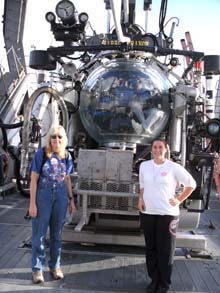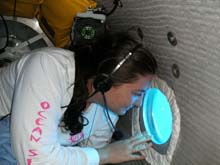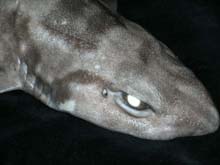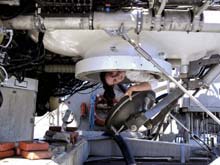
Dr. Tamara Frank, chief scientist and graduate advisor, and Gabby Barbarite (right) prepare to enter the Johnson-Sea-Link II. Click image for larger view and image credit.

Graduate student Gabby Barbarite peers out the aft compartment porthole during her first submersible dive experience. Click image for larger view and image credit.
My First JSL Sub Dive
July 22, 2009
Gabby BarbariteGraduate Student
Out of all the adventures in the world, I must say that journeying to the bottom of the ocean takes the gold! I never imagined that as a graduate student I would have the opportunity to explore the ocean floor. I am working on my master's degree at Harbor Branch Oceanographic Institution at Florida Atlantic University (FAU) under the direction of Dr. Tammy Frank. We will be investigating shark vision. I am not conducting any of my own research on this trip; however, I do hope to see some sharks while in the Bahamas. I have been invited on this cruise to assist Dr. Frank with her work on deep-sea crustacean vision, and to gain the experience of doing research at sea.
Today was my first sub dive, and I was excited to discover a whole new world of diving. For years, I have enjoyed exploring the ocean while scuba diving, but this experience would be much different. The deepest I had dove on scuba was about 43 meters (140 feet), so when I heard that we would be diving to 610 m (2,000 ft), I was a little nervous. I didn’t quite know what to expect other than that it would be dark and cold, and that I would see all sorts of new creatures. I was curious, excited, and nervous — all at the same time.
After our dive briefing, we boarded the Johnson-Sea-Link II (JSL II) submersible. Frank, the sub pilot, and Dr. Frank, the expedition's chief scientist, sat in the front sphere. I sat in the back with the co-pilot, Jimmy. The launch was incredibly smooth, and within minutes we were under way. The journey to 610 m (2,000 ft) took about 20 minutes. It was really cool to watch the color of the water transition from bright blue to dark blue and eventually, at around 305 m (1,000 ft), to black. We finally landed on the bottom and assessed the site’s conditions. The water was about 10ºC (50ºF) , the visibility was about 12 m (40 ft), and there was a pretty strong current.
Our mission was to retrieve the trap and bait bag that were deployed yesterday. While searching for the gear, we had a great view of the ocean floor and the organisms covering it. It looked like a scene from a Dr. Seuss book. There were beautiful sea lilies, delicate corals, sea stars, sea fans, and an occasional fish or shark. After about 30 minutes we located and recovered the gear. The trap was empty and the bait bag had an entangled blotched catshark, Scyliorhinus meadi.
After about two and a half hours on the bottom, we had to start our ascent. During our ascent to the surface, we turned off all the lights and were dazzled by the bioluminescent organisms all around us. We saw little bright blue flashes against the black water for a few hundred feet. After about 20 minutes the water returned to a brilliant blue, and shortly after, we broke the surface.
Once the JSL II was secured, we unloaded the traps, bait bag, and catshark, and took the shark into the lab to study it. This species had been known to be fluorescent, so we turned out the lights and viewed it using a strong blue light. We wore yellow glasses to block the blue light, and were able to see tiny little yellow dots all along its back. I had worked in the FAU Shark Lab for two years, but this was only my second encounter with a deep-sea shark, and the first time looking at one fluoresce. It was pretty awesome! We plan to bring the shark back to Harbor Branch and use it as a display at our Ocean Discovery Center. Dr. Frank said that out of all of her JSL trips, she had never seen the sub recover a shark. So given my strong interest in sharks, this was the perfect first dive for me!
This research cruise has been such an awesome opportunity, and I’m enjoying every second of it. Diving in the JSL II was such an amazing experience — unlike any I have had before! I am excited to continue exploring the ocean, and I look forward to what the next week of diving has in store for us!






















